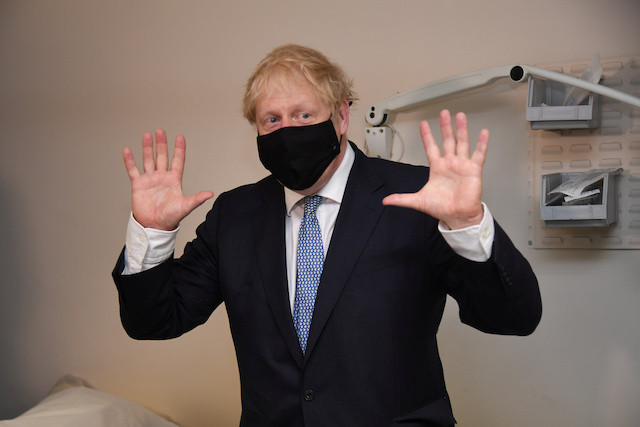Popular Reads
Top Results
Can't find what you're looking for?
View all search resultsPopular Reads
Top Results
Can't find what you're looking for?
View all search resultsJohnson heads to Brussels as time runs out for Brexit deal
Chief EU negotiator Michel Barnier and his UK counterpart David Frost have talked for eight months but remain divided over fishing rights, rules for fair trade and an enforcement mechanism for regulatory standards after Britain emerges from single market rules on Dec.31.
Change text size
Gift Premium Articles
to Anyone
B
ritish Prime Minister Boris Johnson will head to Brussels in the coming days in a bid to save the dying hopes of a post-Brexit trade pact, after the latest round of negotiations broke up Monday without agreement.
Chief EU negotiator Michel Barnier and his UK counterpart David Frost have talked for eight months but remain divided over fishing rights, rules for fair trade and an enforcement mechanism for regulatory standards after Britain emerges from single market rules on Dec.31.
"Talks are in the same position now as they were on Friday. We have made no tangible progress. It's clear this must now continue politically," a senior UK government source said.
"While we do not consider this process to be closed, things are looking very tricky and there's every chance we are not going to get there."
After the envoys' latest session in Brussels - and with just over three weeks until Britain leaves the single market - Johnson held a phone call with EU chief Ursula von der Leyen and secured an invitation to head over in person.
"We agreed that the conditions for finalizing an agreement are not there due to the remaining significant differences on three critical issues: level playing field, governance and fisheries," Johnson and von der Leyen said in a joint statement.
"We asked our chief negotiators and their teams to prepare an overview of the remaining differences to be discussed in a physical meeting in Brussels in the coming days."
It was not immediately clear whether Johnson's visit would be a separate event, or whether he might be slotted in ahead of a EU summit that begins on Thursday, with the other 27 EU leaders meeting in person.
The announcement of Johnson's trip came after a pessimistic day of negotiations, during which Barnier told skeptical MEPs that Wednesday was the effective deadline for a solution.
The president of the European Council Charles Michel held a video call with von der Leyen, French President Emmanuel Macron and German Chancellor Angela Merkel to discuss the agenda of Thursday's summit - including a chance to take stock of Brexit.
All eyes were on the EU summit when the outline of a deal - or an admission of the failure to find one - will be put to the bloc's 27 leaders.
A senior EU diplomat said the leaders would either "welcome a deal" if there was one there, or demand urgent contingency measures in the event talks failed.
"These are going to be decisive hours for the future of our UK relations, and I guess we are at the 'make it or break it' moment," the diplomat told reporters.
Ratcheting up the drama, Michael Gove, a top UK minister and close ally of Johnson, was sent to Brussels for separate talks to discuss implementing the existing divorce treaty.
After a meeting with EU vice president Maros Sefcovic, the UK government said it was ready to revoke clauses in Brexit legislation that have provoked legal action by the EU and undermined trust in London.
Last month the British parliament's upper House of Lords overwhelmingly chose to excise the controversial clauses, but on Monday evening MPs in the lower House of Commons voted to reinstate them to the legislation. The bill will now go back to the House of Lords.
Britain left the EU on January 31 and entered a transition period to allow negotiations to establish a trade relationship with zero tariffs and zero quotas.
Most sources agree that the hardest issue was how to guarantee fair trade in future ties and establish a quick penalty mechanism if either side were to backtrack on, for example, environmental or health standards.
The EU fears Britain slashing its regulations, which could allow its companies to undercut European firms.










